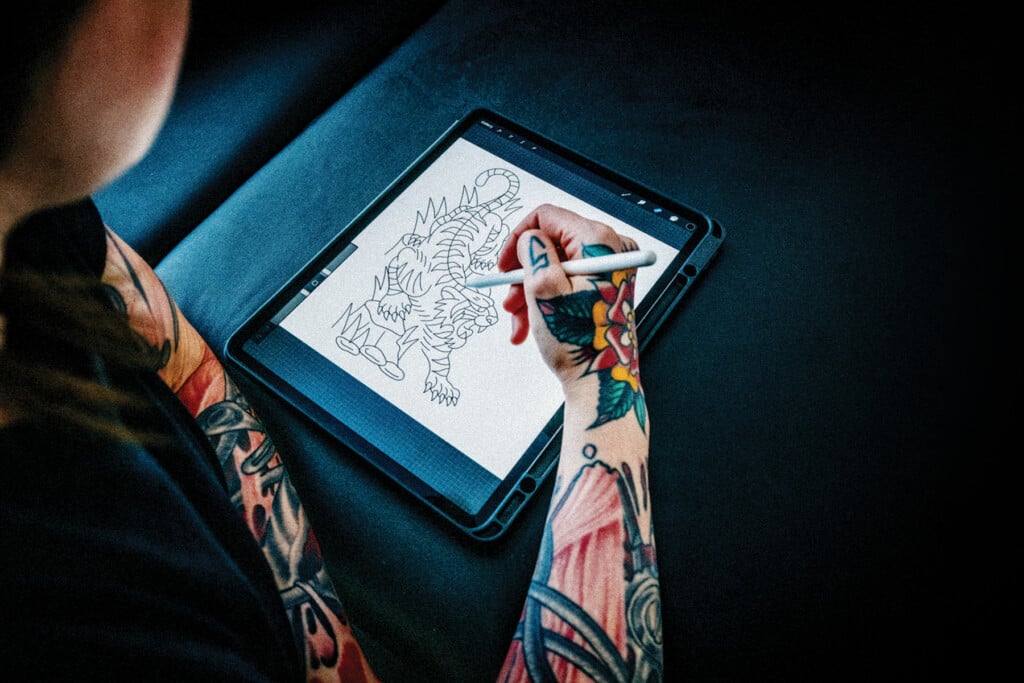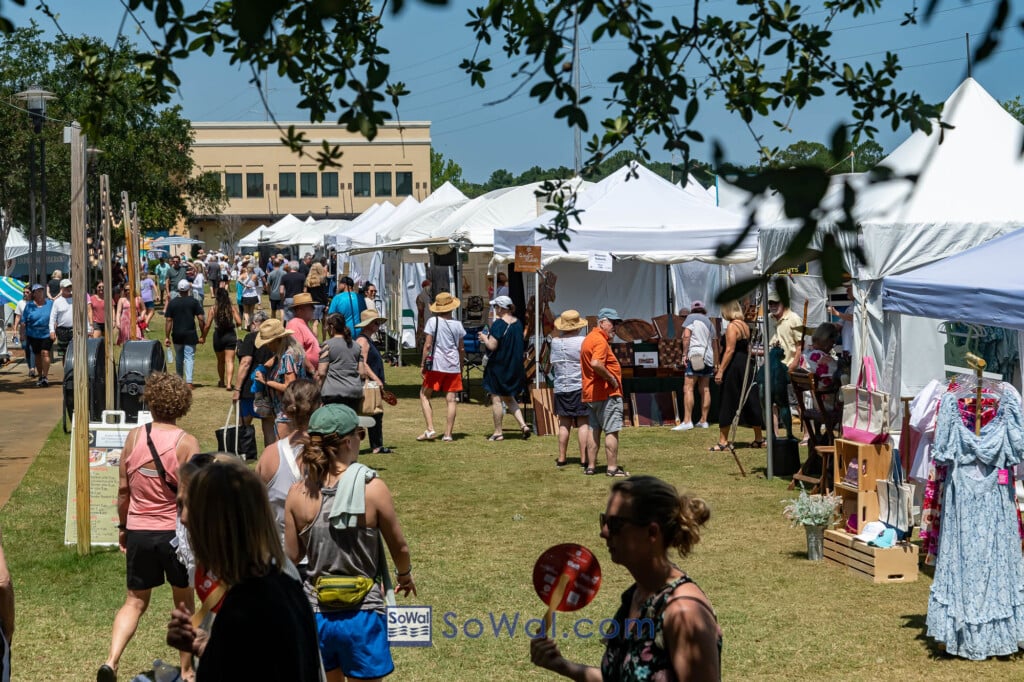A New Tattooing Era
Pensacola tattoo artists experience industry shifts as technology advances and culture evolves

The tattoo industry has long thrived in Pensacola where a perfect combination of military members, locals, and tourists have kept books full at shops throughout town for decades.
“I think it’s just a really good, supportive community,” says Carrie Daniels, Fortune Tattoo shop owner. “Not only for tattooers but just artists in general.”
But the industry has seen much change since the days when the sounds of coil machines drowned out drunken walk-in requests and Sailor Jerry and Ed Hardy designs flooded the walls of every shop in town.
“The days are gone of picking something off the wall,” says Gabe Smith, better known in Pensacola as Famous Gabe, owner of Electric Robot tattoo shop.
“Tattooing had this family tree,” he says. “And then the internet came out, and now the industry is diluted. People don’t know their lineage anymore; they don’t respect that lineage.”
Smith has been tattooing in Pensacola for 30 years. His long gray beard, shaved head, and fully tatted arms tell the story of an old-school tattooer. But even he has been forced to accept the change and pivot.
“You have to embrace the technology,” he says. “You can do that and still adhere to tradition.”
Too, he says, the internet has provided a more level playing field as trends, innovations, and technological advancements are shared instantly via online articles and social media platforms.
“It used to be you had to look at a magazine for something, and that’s your reference,” says Carrie Daniels, owner of Fortune Tattoo. “Now, you can just pull it up on your phone and automatically find whatever you want.”
New tattoo pen technology has taken over for many tattooers. At Fortune, Daniels says she’s the last artist yet to make the switch. Like Smith, she holds onto aspects of simpler tattooing times.
“You still have people who stay tried and true to original equipment,” she says, “and that’s pretty cool.”
Still, Daniels notes, there are plenty of industry norms worth leaving in the past.
When I apprenticed, it seemed like no one wanted to give me any information,” she recalls of her time as a young mentee in Jacksonville. “You had to figure it out on your own. But you had to put in all the physical work just to be there.”
A woman entering the industry in the early 2000s and working in all-male shops, Daniels ran into challenges.
“At the time, it was not welcoming for women; it was very hard to get into,” she says. “You definitely had to find your place. You put your head down and grind.”
Today she owns a shop with a majority of women tattooers.
“I just wanted a comfortable and fun place for artists and clientele,” she says of opening Fortune Tattoo. “Because I think, a lot of times, people are intimidated and scared to come into a tattoo shop.”
The Western Rose tattoo shop entered the scene in 2021 with similar intentions of breaking cycles.
“We avoid a lot of the negative side, the toxic side of tattooing, because of this space that we’ve built together,” says Victoria Higgins, one of four Western Rose artists.
The shop is run as a cooperative, made up of Higgins, Ali Roudabush, Reagan Mauldin, and Dave Ham. The four artists split costs evenly based on occupied square footage.
“As opposed to someone else being in charge of everyone else’s artwork and making a profit off of other artists, no artist is profiting off of another one here,” Ham explains.
A growing industry shift, the cooperative approach helps prevent an imbalance in power structures and overhead expenses.
“I think the toxicity of tattoo culture is changing, which is awesome,” Mauldin says.
Mauldin, Higgins, Ham, and Roudabush found each other at a time when they were all ready for change within the industry after working at other shops and in other career fields that proved unhealthy environments.
“When I first started, it was very male-dominated with very toxic male egos, and you were just kind of told what to do,” says Mauldin, who’s been tattooing for over seven years. “You were supposed to be seen and not heard, and you work your a– off for a percentage that you deserved more of. And now, I work in a co-op with my best friends, where they respect me and they listen to me, and with clients that are the same.”
The Western Rose team has curated a safe, welcoming environment for clients.
“It’s completely shifted into the healthiest work environment I’ve ever been in,” Mauldin says.
The unassuming cottage on South De Villiers Street greets patrons with its plant-filled porch, and inclusive signage welcomes with phrases like “The future is queer.” Inside, beyond the equipment, tools, and safety features, there’s nothing medical or transactional about the space. The air is calm, the music is chill, the greenery is abundant, and the walls and shelves are adorned with eclectic decor.
Despite negative past experiences, the group says Pensacola has given them a space they belong in as creatives.
“The creative scene here is very community based,” Higgins says.
“Pensacola is a good place to be a tattooer just because of the military base, and the downtown crowd is very ‘locals support locals,’” Ham says.
The local market scene thrives in Pensacola where creatives of all walks come out in droves. In August 2024, The Western Rose hosted a vendor market and tattooing convention called Mystic Rodeo.
The event was organized as a fundraiser for Roudabush who was diagnosed with cervical cancer in 2023. With 20 vendors and 10 tattoo artists, the market welcomed the community to enjoy a day of art, live music, and flash tattooing in an effort to support Roudabush on her treatment journey.
“It was just a really good example of Pensacola showing up for a local person,” says Ham. “Also, the art there was really incredible.”
Mystic Rodeo raised $11,000 for Roudabush. The group hopes to make Mystic Rodeo an annual fundraiser event to benefit area organizations and nonprofits.
While many are shifting industry culture to focus on community, decades of bad habits still linger for some. And apprenticeships, as Daniels and Mauldin noted, can prove difficult for new tattooers entering the scene.
“Because there is no curriculum or system, you can get abused real quick, and you can be taken advantage of,” says Mauldin. “And I think that happens more often than not until the mentor decides, ‘Okay, you’re worth your salt; now I’ll give you real information.’”
“There’s a responsibility for someone who wants to get in the tattoo industry to find the mentor who they think is going to teach them correctly and not abuse their time or them,” says Ham. “It’s really important to have a good relationship with your mentor.”
“And nobody should ever pay for their apprenticeship,” Higgins adds.
The group at The Western Rose hopes to instill a new era of tattoo culture in the community.
“We all came from kind of messed up situations,” Mauldin says, “and now we’re in this environment that is healthy, and we’re open to learning, growing, and communicating.”





